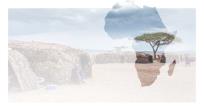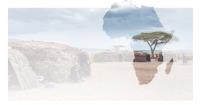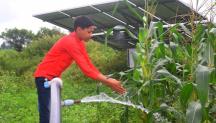

Africa Renewable Energy Projects Making a Difference
Newsletter
IRENA’s newly released report Africa 2030 provides a comprehensive roadmap for the continent’s energy transition, and illuminates a viable path to prosperity through renewable energy development. The report finds that Africa could feasibly generate 22% of its energy needs through the use of indigenous, clean, renewable energy by 2030. This is more than quadruple the 5% in place today. In doing so it would eliminate power shortages, bring electricity and development opportunities to rural villages, spur on industrial growth, create entrepreneurs, and support increased prosperity across the continent.
The report identifies nearly 10 exajoules – the equivalent of more than 341 megatonnes of coal – of options for sustainable development through renewable energy. Roughly 40 per cent of this energy would be in the power sector and 50 per cent of the energy would be through biomass-based heat applications.
As part of this roadmap, the following projects and programmes were highlighted to show action already taking place on renewables in Africa. They support renewables for heating, cooling and drying; provide capacity building, access to finance and create jobs; and provide holistic support.
Renewables for Heating/Cooling/Drying
- The ISAAC solar icemaker produces up to 50 kg of ice per sunny day that is capable of chilling up to 100 litres of milk. It induced businesses in Kenya for milk production, milk collection, packaging and sale for cooperatives, and the production of yogurt and mala that are sold at a higher price, generating additional profits.
- The Developing Energy Enterprise Programme supports the deployment of improved cookstoves in Kenya, Uganda and Tanzania. At the end of June 2012, the program was supporting a total of 975 businesses across East Africa, 492 of which in the cookstove sector. Out of these, 257 are led by women.
- Tunisia’s PROSOL funding mechanism started in 2005 with a supplier-lending phase, followed with a second consumer-lending phase that granted direct credit to households for solar water-heater installation and relieved suppliers from debt liability.
- South Africa’s solar water heater programme by the national energy regulator of South Africa, ESCOM, has subsidized purchases of registered solar water heaters since 2008. By the end of 2011, more than 122 000 systems were rolled out, resulting in energy savings of approximately 60 GWh/year.
- A large proportion of food products spoil before reaching market and drying products reduces such waste considerably. Solar dryers in Ghana developed by Silwood Farms at Pokuase reduce moisture content in maize from approximately 20 to 10 per cent within 6 days at 35–38°C, with similar results in other locally grown crops such as cassava, pepper, okra and pineapple.
Capacity Building for Renewable Energy Entrepreneurs
IRENA and the ECREEE have established the ECOWAS Entrepreneur Support Facility in April 2015 to provide advisory assistance to small and medium-sized renewable energy (particularly solar PV) entrepreneurs on matters related to business management and operations, project proposal refinement as well as supporting an entrepreneur to successfully bring his or her innovative ideas to fruition.
Access to Finance for Renewable Projects
- The PSP Hydro project supports the construction of micro hydropower plants and invests in capacity building activities. PSP Hydro support has resulted in the development of six private micro hydropower plants.
- The IRENA/ADFD Project Facility has supported renewable projects in Mali, Mauritania and Sierra Leone. By providing up to half of a project’s needed funding, the facility reduces the investment challenges hindering efforts to extend electricity access across Africa.
Job Creation
Solar Sister is an initiative that retails portable solar lights in rural sub-Saharan Africa through female solar entrepreneurs. Sister uses a system of micro-consignment: female entrepreneurs selling solar lights do not pay for their inventory until a sale is made and cash flow is available, and no interest is charged.
Africa 2030 is built on a country-by-country assessment of supply, demand, renewable energy potential, and technology prospects. The effort is a part of IRENA’s REmap 2030 programme, which provides a roadmap to double the share of renewable energy in the world’s energy mix by 2030.
RRA is a country-driven process that helps IRENA to engage with relevant national or regional stakeholders in a dialogue to pinpoint renewable energy drivers, comparative advantages, enabling policies and measures. So far 12 RRAs have been facilitated in Africa and have triggered tangible changes in legislation, institutional set-ups and have led to concrete regional advisory services and initiatives.




